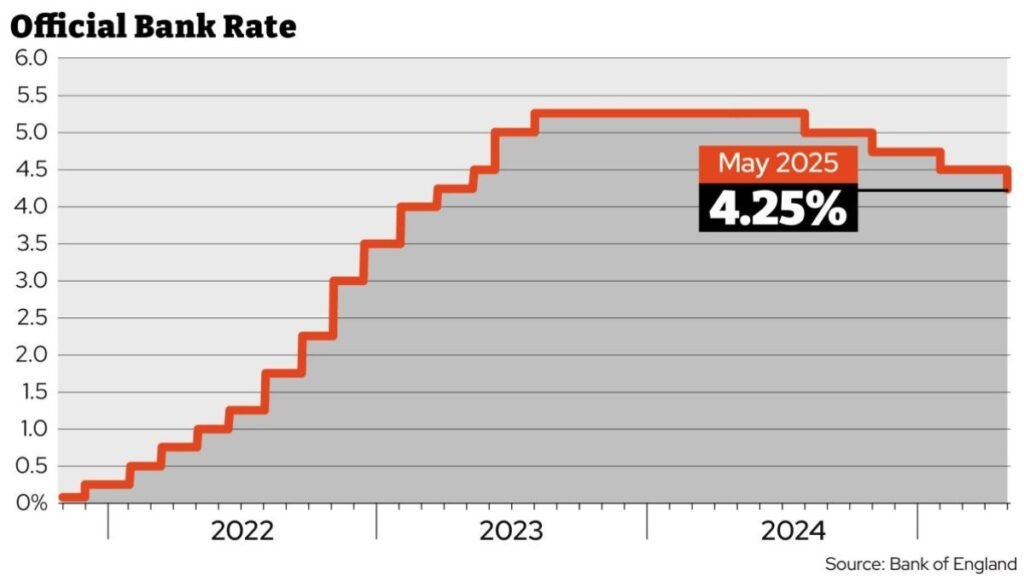Several economists believe there will be just one more base rate cut this year as a result of higher than expected inflation
Interest rates are expected to be cut just once more this year, economists predict, in a fresh blow to Britain’s mortgage holders.
High inflation and increased growth have led experts to change their predictions from several base rate cuts later this year to just one.
It spells misery for homeowners on tracker mortgages directly tied to the Bank of England’s base rate, who will have been hoping for several cuts in order to see their payments fall significantly.
The predictions are also a blow for those due to come off fixed-rate mortgages later in 2025 as new deals are now unlikely to be as cheap as they had anticipated.
While improved growth is helpful for Chancellor Rachel Reeves’s economic plans, higher inflation and fewer rate cuts make it harder for herself and Prime Minister Keir Starmer to keep their promise to bring down the cost of living.
Growth next year will also be weighed down by global trade tensions.
The Bank has cut rates twice this year already to 4.25 per cent, and some economists had been predicting two to three more.
BBut Pantheon Macroeconomics is now forecasting only one more cut – down from two – because of “solid growth momentum, a fading uncertainty shock, inflation 1.5 percentage points above target and a slowing pace of disinflation.”
Inflation from the year to April is currently at 3.5 per cent, the highest level in over a year. It exceeded both the Bank of England’s forecast of 3.4 per cent and analysts’ expectations of 3.3 per cent.
Sam Miley, head of forecasting at the Centre for Economics and Business Research (CEBR), agreed with Pantheon’s predictions. “We have expressed similar views, expecting interest rates to be cut only gradually as a result of continually problematic inflation,” he said.
The National Institute of Economic and Social Research (NIESR) is also predicting one cut, with Stephen Millard, interim director, saying: “The strong April inflation number only reinforced our view. The forecast revisions being negative over the past couple of years simply signifies that we’ve been hit by negative surprises over the past couple of years.”
Others believe there will be no further cuts at all. Andrew Sentence, an economist who used to be on the Bank’s Monetary Policy Committee (MPC), said: “It’s always difficult to predict what the MPC will actually do, but in terms of what they should do, I think no further interest cuts is the best course of action. If they are to cut interest rates again, I doubt it will be before November.
“The summer is likely to see a big surge in inflation. It will certainly go above 4 per cent and could reach as high as 5 per cent. He said strong price and cost rises were hitting business confidence.
He added: “Yesterday, we had evidence of high grocery price increases. So the bad news on inflation just keeps on coming.”
Other economists suggest there is still a chance of two more rate cuts.
Economist Thomas Pugh, of the RSM UK consultancy, said: “Our base case is still for two cuts – but the risks are weighted towards only one.
“Growth seems a bit stronger than the surveys suggested, and inflation was very slightly higher, which tilts the risk towards the MPC skipping a cut. But we haven’t had any business-to-business activity data yet, which was mostly likely to be impacted by tariffs compared to consumers so I’m not sure we’re out of the woods yet.
“To me, a rate cut in August now looks more like a 50/50 chance.”
Paul Dales, chief UK economist at Capital Economics, said: “We haven’t changed our forecasts for two more cuts to 3.75 per cent by the end of this year and one more in early 2026 to 3.50.
“That said… It’s perfectly possible that concerns over inflation and wages will prevent the Bank from cutting rates in August.”
Impact on mortgages
Fixed mortgage prices are heavily based on swap rates, which follow long-term predictions for where the Bank of England base rate will go in the future.
Swap rates have been climbing steadily in the past few weeks with several lenders increasing their deals.
The cheapest two-year fixed rate from Barclays has now been increased from 3.87 per cent to 3.97 per cent whilst other lenders have upped rates to above 4 per cent.
Nick Mendes, of brokers John Charcol, said recent rises in swap rates were “significant… in a short space of time” and “reflect the market’s response to persistent inflation and reduced confidence in near-term rate cuts.”
David Hollingworth, of brokers L&C, said: “Even though interest rates should still fall this year, we may see relatively limited differences in fixed mortgage rates, which have already priced those drops in.”
If there is just one more cut, homeowners and buyers will have to brace themselves for higher rates for longer.
Justin Moy, of EHF Mortgages, said: “The knock-on effect for mortgage rates will not be ideal, swap rates have started to increase and this is giving high street lenders little choice but to reprice, taking the cheapest deals over that 4 per cent line.
“Specialist lenders are still looking to cut rates, where they have greater margin and some scope to make improvements to control market share, but with wafer-thin margins in the high street, we expect to see rates creep up slowly over the summer.”
People coming to the end of their existing mortgage can lock in a rate months in advance with a borrower and could switch on to another deal should a better one become available.

